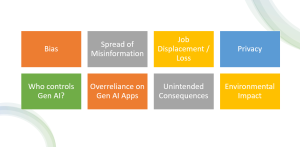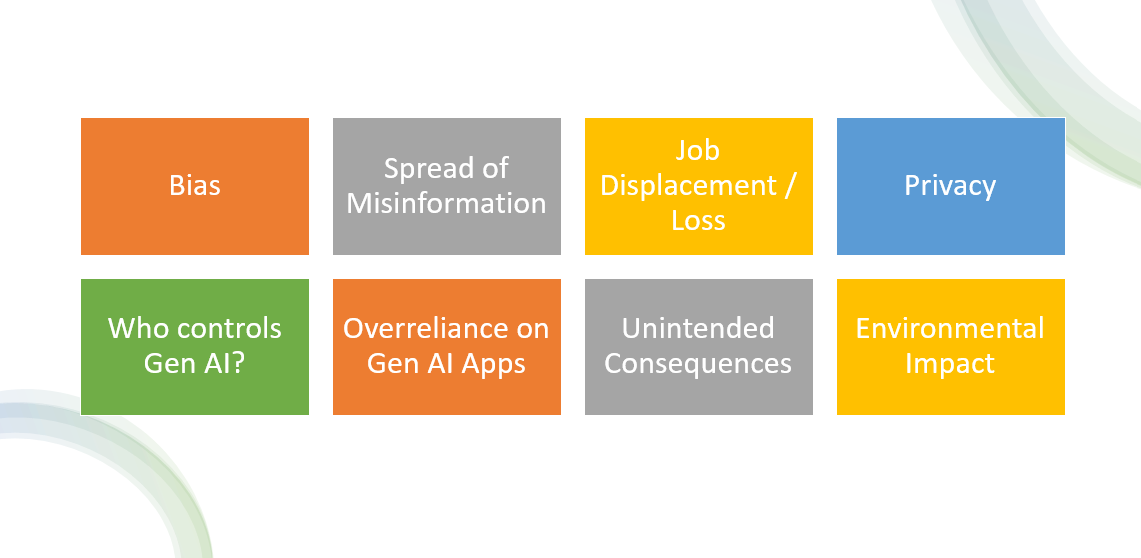
In the ever-evolving realm of artificial intelligence, generative AI has emerged as a groundbreaking technology, capable of producing incredibly realistic and creative content. From generating art and music to crafting compelling stories and even mimicking human conversations, the possibilities seem endless. Here is a sample representing AI generated talk between Bill Gates & Socrates. You can as well imagine about the endless possibilities.
As with any powerful tool, there are risks and concerns related to generative AI that need to be addressed. In this blog, we will delve into the fascinating world of generative AI and explore some of the key concerns it brings forth. We will learn with some real-life examples that highlight the potential pitfalls of this generative AI technology.
Key Risks & Concerns of Generative AI
Geoffrey Hinton, one of the fathers of AI, recently echoed concerns about the potential dangers of generative AI. In an interview with The New York Times, Hinton said that he is worried that generative AI could be used to create deep fakes, which are videos or audio recordings that have been manipulated to make it look or sound like someone is saying or doing something they never said or did. Hinton is also concerned that generative AI could be used to create misinformation and propaganda, which could lead to social unrest and instability.
Generative AI is a revolutionary technology with boundless possibilities, but it also presents significant risks and concerns. In this blog section, we delve into the ethical, societal, and environmental challenges associated with generative AI.

Some of the following are the key concerns we need to get a deeper understanding of, in order to get a sense of the responsibilities that accompany its use.
- Bias due to data bias: One of the major concerns with generative AI is the potential for bias to be encoded and perpetuated in the generated content. For example, imagine a generative AI system trained on a biased dataset of movie scripts. If the system is then used to generate new movie scripts, it may inadvertently produce content that reinforces stereotypes or promotes discriminatory narratives, leading to a perpetuation of bias in the entertainment industry.
- Spread of Misinformation: Generative AI has the potential to generate highly convincing fake content, including text, images, and videos. This raises concerns about the spread of misinformation and fake news. For instance, imagine a generative AI model that can create realistic news articles. If such a model falls into the wrong hands, it could be used to generate false news stories, leading to widespread confusion and manipulation of public opinion.
- Job displacement / loss due to automation: The rapid advancement of generative AI technologies also raises concerns about job loss and economic disruption. For instance, in the creative industry, where generative AI can now generate music, art, and writing, there is a risk that human artists and content creators may be replaced by AI-generated works, leading to unemployment and a loss of livelihood for many individuals. In a March 2023 report, Goldman Sachs economists estimated that generative AI could automate up to one-fourth of current jobs globally, or 300 million. They further estimated that, of those occupations that are exposed, roughly a quarter to as much as half of their workload could be replaced. But not all that automated work will translate into layoffs, the report says.
- Privacy issues owing to data leak : Generative AI systems often require large amounts of data to train effectively, and this can pose privacy risks. For example, consider a chatbot powered by generative AI that interacts with users and generates responses. If the chatbot collects and stores personal information during conversations, there is a risk that this data could be mishandled or compromised, potentially leading to privacy breaches and unauthorized access to sensitive information.
- Who controls generative AI?: As generative AI systems become more sophisticated, there is a concern about who has control over the content they produce. For instance, if an AI system is given the ability to generate persuasive political speeches, there is a risk that it could be used to manipulate public opinion or deceive individuals. This raises ethical questions about the responsible use and governance of generative AI technologies.
- Overreliance on generative AI applications: With the increasing capabilities of generative AI, there is a risk of overreliance on these systems without proper understanding or critical evaluation. For example, if an individual heavily relies on an AI-powered language translation tool, they may unknowingly accept inaccurate or misleading translations, leading to misunderstandings or miscommunications in important situations.
- Unintended consequences: Generative AI systems operate based on patterns and correlations they learn from data, but they may produce unexpected or unintended outcomes. For instance, a generative AI model trained to generate images of animals might start producing bizarre and unrealistic hybrids that do not exist in the real world, resulting in potentially confusing or nonsensical outputs.
- Environmental impact (increased carbon emissions): The computational resources required to train and deploy generative AI models at scale can have a significant environmental impact. For example, large-scale training of AI models consumes massive amounts of energy, contributing to increased carbon emissions and exacerbating the problem of climate change. This issue calls for the development of more energy-efficient algorithms and the adoption of sustainable practices in the AI industry to mitigate the environmental footprint of generative AI.
Get the information in form of following crisp slides titled as “Generative AI: Risks & Concerns”.
Conclusion
The blog has shed light on the multifaceted landscape that demands attention and careful consideration in relation to risks and concerns related to generative AI. From the potential biases embedded in AI-generated content to the risks of misinformation and job displacement, the implications of this powerful technology are far-reaching. Privacy, control, and overreliance present additional challenges, while the unintended consequences and environmental impact emphasize the need for responsible action. By acknowledging these concerns and actively addressing them, society can foster a future where generative AI is harnessed for positive impact while mitigating the potential risks. Collaboration, ethical guidelines, and ongoing research are essential to shaping a responsible and beneficial integration of generative AI. With knowledge, awareness, and a commitment to responsible use, society can navigate the transformative potential of generative AI and ensure a brighter future for all.
- The Watermelon Effect: When Green Metrics Lie - January 25, 2026
- Coefficient of Variation in Regression Modelling: Example - November 9, 2025
- Chunking Strategies for RAG with Examples - November 2, 2025

I found it very helpful. However the differences are not too understandable for me